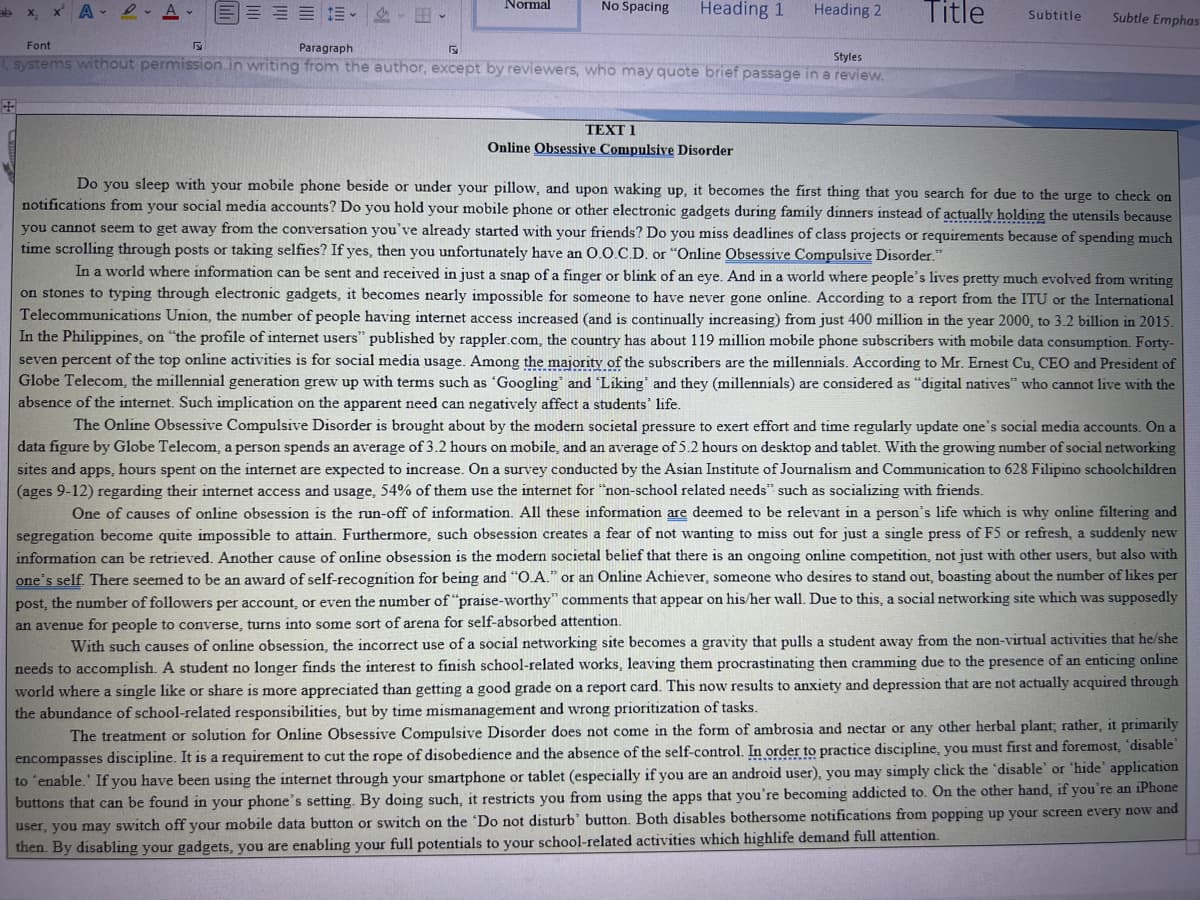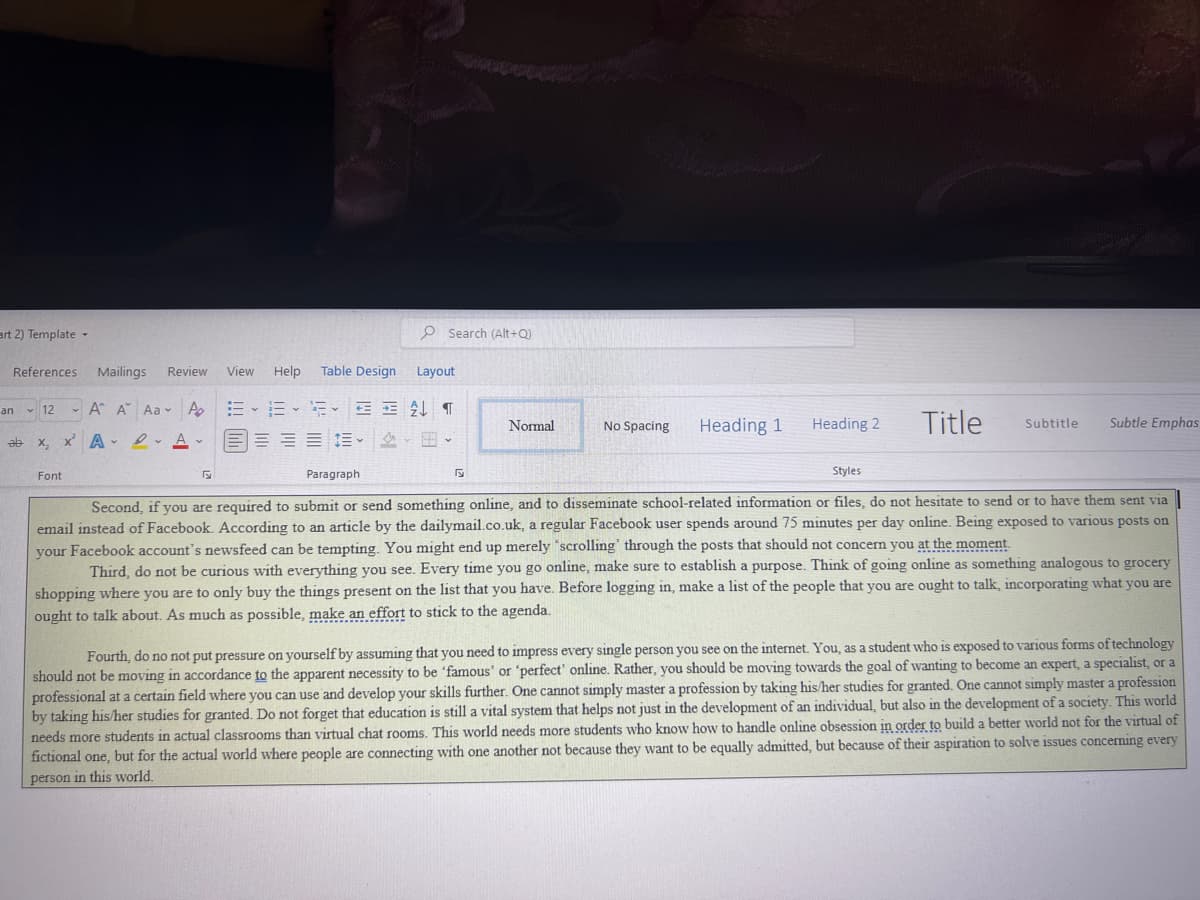GUIDE QUESTIONS: COHERENCE AND COHESION -Are the ideas logically arranged and sequenced? -Are the ideas connected? -What cohesive devices were used? -Does the text stay on topic? Etc… ANSWER ONLY TEXT 1 THANK YOU IN ADVANCE!! ?
GUIDE QUESTIONS: COHERENCE AND COHESION -Are the ideas logically arranged and sequenced? -Are the ideas connected? -What cohesive devices were used? -Does the text stay on topic? Etc… ANSWER ONLY TEXT 1 THANK YOU IN ADVANCE!! ?
Principles of Microeconomics
7th Edition
ISBN:9781305156050
Author:N. Gregory Mankiw
Publisher:N. Gregory Mankiw
Chapter22: Frontiers Of Microeconomics
Section: Chapter Questions
Problem 10PA
Related questions
Question
GUIDE QUESTIONS:
COHERENCE AND COHESION
-Are the ideas logically arranged and sequenced?
-Are the ideas connected?
-What cohesive devices were used?
-Does the text stay on topic?
Etc… ANSWER ONLY TEXT 1 THANK YOU IN ADVANCE!! ?

Transcribed Image Text:ab x, x' A . A-
目三=三 、
Normal
No Spacing
Heading 1
Heading 2
Title
Subtitle
Subtle Emphas
Font
Paragraph
Styles
T systems without permission in writing from the author, except by reviewers, who may quote brief passage in a review.
TEXT 1
Online Obsessive Compulsive Disorder
Do you sleep with your mobile phone beside or under your pillow, and upon waking up, it becomes the first thing that you search for due to the urge to check on
notifications from your social media accounts? Do you hold your mobile phone or other electronic gadgets during family dinners instead of actually holding the utensils because
you cannot seem to get away from the conversation you've already started with your friends? Do you miss deadlines of class projects or requirements because of spending much
time scrolling through posts or taking selfies? If yes, then you unfortunately have an 0.0.C.D. or "Online Obsessive Compulsive Disorder."
In a world where information can be sent and received in just a snap of a finger or blink of an eye. And in a world where people's lives pretty much evolved from writing
on stones to typing through electronic gadgets, it becomes nearly impossible for someone to have never gone online. According to a report from the ITU or the International
Telecommunications Union, the number of people having internet access increased (and is continually increasing) from just 400 million in the year 2000, to 3.2 billion in 2015.
In the Philippines, on "the profile of internet users" published by rappler.com, the country has about 119 million mobile phone subscribers with mobile data consumption. Forty-
seven percent of the top online activities is for social media usage. Among the majority of the subscribers are the millennials. According to Mr. Emest Cu, CEO and President of
Globe Telecom, the millennial generation grew up with terms such as 'Googling' and Liking' and they (millennials) are considered as "digital natives" who cannot live with the
absence of the internet. Such implication on the apparent need can negatively affect a students' life.
The Online Obsessive Compulsive Disorder is brought about by the modern societal pressure to exert effort and time regularly update one's social media accounts. On a
data figure by Globe Telecom, a person spends an average of 3.2 hours on mobile, and an average of 5.2 hours on desktop and tablet. With the growing number of social networking
sites and apps, hours spent on the internet are expected to increase. On a survey conducted by the Asian Institute of Journalism and Communication to 628 Filipino schoolchildren
(ages 9-12) regarding their internet access and usage, 54% of them use the internet for "non-school related needs" such as socializing with friends.
One of causes of online obsession is the run-off of information. All these information are deemed to be relevant in a person's life which is why online filtering and
segregation become quite impossible to attain. Furthermore, such obsession creates a fear of not wanting to miss out for just a single press of F5 or refresh, a suddenly new
information can be retrieved. Another cause of online obsession is the modern societal belief that there is an ongoing online competition, not just with other users, but also with
one's self. There seemed to be an award of self-recognition for being and "O.A." or an Online Achiever, someone who desires to stand out, boasting about the number of likes per
post, the number of followers per account, or even the number of "praise-worthy" comments that appear on his/her wall. Due to this, a social networking site which was supposedly
an avenue for people to converse, turns into some sort of arena for self-absorbed attention.
With such causes of online obsession, the incorrect use of a social networking site becomes a gravity that pulls a student away from the non-virtual activities that he/she
needs to accomplish. A student no longer finds the interest to finish school-related works, leaving them procrastinating then cramming due to the presence of an enticing online
world where a single like or share is more appreciated than getting a good grade on a report card. This now results to anxiety and depression that are not actually acquired through
the abundance of school-related responsibilities, but by time mismanagement and wrong prioritization of tasks.
The treatment or solution for Online Obsessive Compulsive Disorder does not come in the form of ambrosia and nectar or any other herbal plant; rather, it primarily
encompasses discipline. It is a requirement to cut the rope of disobedience and the absence of the self-control. In order to practice discipline, you must first and foremost, 'disable
to 'enable.' If you have been using the internet through your smartphone or tablet (especially if you are an android user), you may simply click the 'disable' or 'hide' application
buttons that can be found in your phone's setting. By doing such, it restricts you from using the apps that you're becoming addicted to. On the other hand, if you're an iPhone
user, you may switch off your mobile data button or switch on the 'Do not disturb' button. Both disables bothersome notifications from popping up your screen every now and
then. By disabling your gadgets, you are enabling your full potentials to your school-related activities which highlife demand full attention.

Transcribed Image Text:art 2) Template -
O Search (Alt+Q)
References
Mailings
Review
View
Help
Table Design
Layout
an 12
- A A Aa Ap
Heading 2
Title
Subtle Emphas
Normal
No Spacing
Heading 1
Subtitle
X,
x A- 2 A -
Font
Paragraph
Styles
Second, if you are required to submit or send something online, and to disseminate school-related information or files,, do not hesitate to send or to have them sent via
email instead of Facebook. According to an article by the dailymail.co.uk, a regular Facebook user spends around 75 minutes per day online. Being exposed to various posts on
your Facebook account's newsfeed can be tempting. You might end up merely scrolling' through the posts that should not concern you at the moment.
Third, do not be curious with everything you see. Every time you go online, make sure to establish a purpose. Think of going online as something analogous to grocery
shopping where you are to only buy the things present on the list that you have. Before logging in, make a list of the people that you are ought to talk, incorporating what you are
ought to talk about. As much as possible, make an effort to stick to the agenda.
Fourth, do no not put pressure on yourself by assuming that you need to impress every single person you see on the internet. You, as a student who is exposed to various forms of technology
should not be moving in accordance to the apparent necessity to be 'famous' or 'perfect' online. Rather, you should be moving towards the goal of wanting to become an expert, a specialist, or a
professional at a certain field where you can use and develop your skills further. One cannot simply master a profession by taking his/her studies for granted. One cannot simply master a profession
by taking his/her studies for granted. Do not forget that education is still a vital system that helps not just in the development of an individual, but also in the development of a society. This world
needs more students in actual classrooms than virtual chat rooms. This world needs more students who know how to handle online obsession in order to build a better world not for the virtual of
fictional one, but for the actual world where people are connecting with one another not because they want to be equally admitted, but because of their aspiration to solve issues concerning every
person in this world.
Expert Solution
This question has been solved!
Explore an expertly crafted, step-by-step solution for a thorough understanding of key concepts.
Step by step
Solved in 2 steps

Knowledge Booster
Learn more about
Need a deep-dive on the concept behind this application? Look no further. Learn more about this topic, economics and related others by exploring similar questions and additional content below.Recommended textbooks for you

Principles of Microeconomics
Economics
ISBN:
9781305156050
Author:
N. Gregory Mankiw
Publisher:
Cengage Learning

Principles of Economics 2e
Economics
ISBN:
9781947172364
Author:
Steven A. Greenlaw; David Shapiro
Publisher:
OpenStax

Principles of Microeconomics
Economics
ISBN:
9781305156050
Author:
N. Gregory Mankiw
Publisher:
Cengage Learning

Principles of Economics 2e
Economics
ISBN:
9781947172364
Author:
Steven A. Greenlaw; David Shapiro
Publisher:
OpenStax